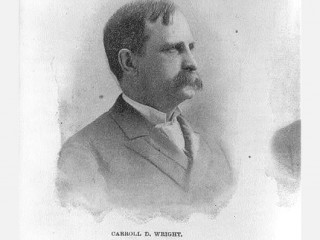
Carroll Wright biography
Date of birth : 1840-07-25
Date of death : 1909-02-20
Birthplace : Dunbarton, New Hampshire
Nationality : American
Category : Science and Technology
Last modified : 2011-01-28
Credited as : Statistician, social economist, Bureau of Labor Statistics
The American statistician and social economist Carroll Davidson Wright organized the Bureau of Labor Statistics and did much to inspire and produce objective research on labor problems.
Carroll Wright was born on July 25, 1840, in Dunbarton, N. H. His father was a Universalist minister, and the family frequently moved from one town to another. Carroll studied at various academies in New England.
In those days there were no formal law programs in universities, and the path to a law degree was to study and work under a seasoned, respected lawyer and then present oneself under that lawyer's sponsorship for examination. Wright began reading law in Keene, N. H., at the same time teaching in the country schools of that district. He continued his study of law in Dedham and Boston until 1862 and then served in the army during the Civil War.
Wright was admitted to the New Hampshire bar in 1865 and to the Massachusetts bar two years later. He developed a rewarding practice in Boston, dealing mainly in patent law. He was elected to the Massachusetts Senate in 1871 and 1872. His major contribution as a state senator was to sponsor legislation which improved to a great extent the militia system of the state.
In 1873 Wright was appointed chief of the Massachusetts Bureau of Labor Statistics, which had been established four years earlier and was the first in the United States. As its head for 15 years during a period of radical economic change in Massachusetts and the United States itself, Wright attempted to objectively amass statistics in this area, which resulted in criticism from both employers and labor. As a result of these early experiences with partisan factions, he was determined that statistics should be gathered with as much objectivity as possible and that they should be published without regard to whether they were in the interest of one group or another. Wright tried to follow this principle throughout his subsequent life, especially through the National Convention of Chiefs and Commissioners of Bureaus of Statistics of Labor, which he organized in 1883 and served as president for almost 20 years.
Wright's own investigations and collections of data encompassed a very broad scope, dealing with wage rates, cost of living, strikes, lockouts, poverty, crime, divorce, illiteracy, housing, and labor legislation. In many of these areas his work was a pioneering effort. He was a moving force behind the establishment of the U.S. Bureau of Labor in the Interior Department. President Chester Alan Arthur appointed him the first commissioner of the new bureau, and he held the post for 20 years.
Wright was professor of statistics and social economics at Columbian University (George Washington University after 1900) and supervised the first volumes of the studies on the economic history of the United States. He was president of the American Statistical Association from 1897 to his death; and he received a number of awards from foreign governments. He became the first president of Clark College in Worcester, Mass., in 1902, although he retained his post with the Bureau of Labor until 1905. He died in Worcester on Feb. 20, 1909.
In his own social philosophy, evident in his many works, Wright specifically denied and abhorred the view that there was an inevitable class conflict between capital and labor. Instead, he urged voluntary cooperation, tolerance, and social responsibility for employers.
For information on Wright see James Leiby, Carroll Wright and Labor Reform: The Origin of Labor Statistics (1960).
















